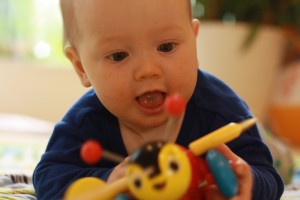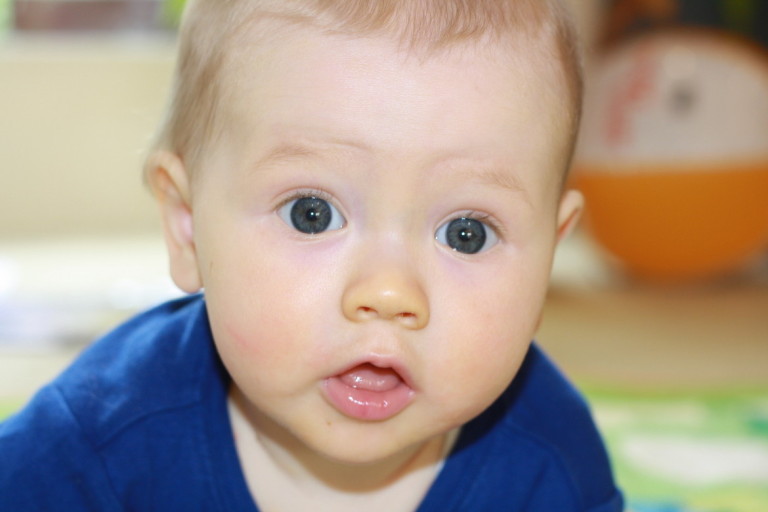First words are a key milestone in learning to talk. The first time your baby says ‘Mummy’ or ‘Daddy’ is an eagerly anticipated moment for all parents; but what happens after those first words emerge? How is your child progressing through their next communication milestones?
Learning to talk is one of the most complex and challenging tasks children face during their preschool years. It’s easy to underestimate just how complex learning to talk actually is.
I’ve been a speech pathologist for 15 years, but it wasn’t until I became a mum that I realised how little information is available for parents about speech and language development. While there seem to be myriad classes for music, dance and sport, there are few that focus on developing communication skills.
‘He doesn’t speak clearly. I know what he wants, but no-one else understands him. He gets so frustrated. How do I help?’
‘Should she be able to say that sound by now? How do I practice it with her?’
These were questions I started hearing often, and my professional knowledge suddenly became a resource for my mothers’ group, playgroup, day-care and my circle of friends.
It takes (literally!) years for children to master the fine motor movements and complex grammatical rules involved in learning to talk, and the steps towards fluent, intelligible speech are very gradual. Communication skills develop from birth and continue throughout childhood; however, up to 25 per cent of children start school every year with a language disorder or delay (Speech Pathology Australia, 2011).
Some pre-schoolers are slow to talk; many have difficulty saying sounds correctly all the time, or make speech errors (for example, ‘tat’ for cat, and ‘dink’ for drink). Some words are more difficult for children to say than others, and some children can become more difficult to understand when they use longer sentences. It’s hard for parents to know what is normal, when they should be concerned, and what they can do to help.
 Parents play a vital role in encouraging children’s communication development during the pre-school period, and during this time, children learn language best by listening to familiar adults speaking it. With this in mind, a simple strategy to try is called “modelling”. Say what you want your child to say, and let them hear those target words frequently. Over time your child will begin to copy the words and sound they hear. Ultimately this is an easier (and far less stressful) way to help your child say “juice” than asking them to repeat themselves!
Parents play a vital role in encouraging children’s communication development during the pre-school period, and during this time, children learn language best by listening to familiar adults speaking it. With this in mind, a simple strategy to try is called “modelling”. Say what you want your child to say, and let them hear those target words frequently. Over time your child will begin to copy the words and sound they hear. Ultimately this is an easier (and far less stressful) way to help your child say “juice” than asking them to repeat themselves!
Children develop speech and language at different rates, but a rough guide to developmental milestones is provided here. If your preschooler’s speech is very difficult to understand, they are becoming frustrated, or their communication development doesn’t fit within this guide, arrange a chat with a speech pathologist for further advice.
A guide to your child’s communication skill by age:
| By 12 months | By 2 years |
| responds to familiar sounds (such as the telephone, or the car in the driveway) | names simple body parts, such as ‘nose’ |
| understands simple commands | listens to stories and names pictures |
| recognises their own name | understands simple questions, such as ‘Where is your shoe?’ |
| understands the names of familiar objects or people | uses 50 to 100 words (commonly, ‘no’, ‘gone’, and ‘mine’) |
| says 5 to 10 words or familiar sounds (for example, car or animal noises) | uses novel 2- to 3-word sentences (such as, ‘Milk all gone.’ |
| enjoys music and books | sings simple songs or nursery rhymes |
| communicates by babbling – using lip sounds (b, m, and w) in sequence, such as ‘baba’. | uses early pronouns (‘me’, and ‘you’) |
| between 9 and 12 months, more sounds emerge, including d, m, n, h, w and t | talks to themselves or their toys during play |
| uses a range of consonant sounds correctly in speech (p,b,m,t,d,n,h,w) | |
| speech is understood by close family members | |
| By 3 years | By 4 years |
| understands how object are used | understands shape/colour name |
| recognises their own needs (such as thirst) | understands concepts and time |
| follows directions such as, ‘Go and get your bag and coat.’) | asks ‘who, what and why’ questions |
| uses 3- to 5-word sentences | uses around 900 words |
| enjoys telling stories and answering questions | uses 4- to 6-word sentences |
| has favourite books and television programs | uses correct grammar with mistakes like ‘I falled down.’ |
| speech understood by familiar adults and peers | speech able to be understood by most people |
| uses correct speech sounds (k, g, f, s, ng) | uses most speech sounds correctly |
| uses consonant clusters of two sounds together (tw, sp, gl, fr) |

